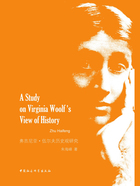
Introduction
Reading Virginia Woolf will change your life,may even save it.If you want to make sense of modern life,the works of Virginia Woolf remain essential.
——Jane Goldman,The Cambridge Introduction to Virginia Woolf vii
In the preface to The Cambridge Introduction to Virginia Woolf,its author Jane Goldman offers a positive appraisal of Virginia Woolf's works,and argues that Virginia Woolf's works can transport readers to a world“where anything in modern life (cinema,sexuality,shopping,education,feminism,politics,war and so on) is explored and questioned and refashioned”(Goldman vii).Although Virginia Woolf's works seem to transcend the time when they were created,and neglect the external world from which she could draw writing materials,they are,in fact,deeply rooted in their historical contexts and reflect historical traits.Indeed,Virginia Woolf's works not only help readers have access to the historical contexts in which her works were created,but help readers understand her strategies of narrating the unofficial history in her modernist works.
From the publication of her first novel The Voyage Out(1915),Virginia Woolf published about seven novels including Night and Day(1919),Jacob's Room (1920),Mrs.Dalloway (1925),To the Lighthouse (1927),The Waves (1931),The Years (1937) and Between the Acts (1941),one short story collection The Haunted House and Others (1944),and three books that she gave the subtitles“A Biography”: Orlando: A Biography(1928),Flush:A Biography (1933),and Roger Fry: A Biography (1940).Besides,she published some essays,such as A Room of One's Own (1929),The Common Reader (1925),The Second Common Reader (1933),Three Guineas (1938) and“Modern Fiction”(1919).Among her works,Mrs.Dalloway,To the Lighthouse,and The Waves are generally accepted as the most famous masterpieces of modernist writings; A Room of One's Own and Three Guineas establish her position as a leading feminist,and The Common Reader,The Second Common Reader,and“Modern Fiction”secure her position as one of the most influential literary critics of the twentieth century.
In addition to the titles of modernist writer,leading feminist and literary critic,Virginia Woolf is also regarded as a leading figure of the Bloomsbury Group,which was composed of John Maynard Keynes,E.M.Forster,Lytton Strachey,etc.Virginia Woolf's literary achievements helped her win the Clark lectureship of Cambridge University,an honorary degree granted by Manchester University which she eventually turned down,and the title of a leading modernist writer sharing the same popularity as James Joyce and Marcel Proust.Her particular strategies of integrating her factual history in the real world and her fictional history in her novels,prompt the writer of book to conduct a thorough exploration of Virginia Woolf's view of history and historiography,strategies and political intention of her historiography.